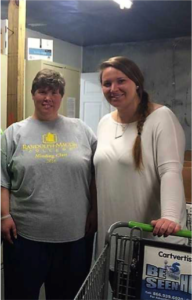Volunteer Opportunities Lead to New Job Skills
Building a resume can be tough, particularly in rural communities where job opportunities may be limited, and competition can be fierce. However, serving your community can be one great and meaningful way to build job skills.
Since 2015, The Arc of the Glades in Belle Glade, Florida, has participated in The Arc’s Martin Luther King, Jr. Day of Service project. The Arc’s MLK Jr. Day of Service project brings together chapters of The Arc to organize inclusive volunteer service projects where people with intellectual and developmental disabilities (I/DD) volunteer alongside people without disabilities to provide food to people in their communities who are in need.*
For Scot Kannel, The Arc of the Glades’ Executive Director, volunteering opportunities like the MLK Jr. Day of Service project have been important gateways to employment in West Palm Beach County because “volunteering builds skills, relationships and good will in the community, paving the way not just for that person’s future employment, but also [raising] community employers’ expectations [and changing their perspectives] about hiring those with differing abilities.”
Throughout the year, volunteers with and without disabilities from The Arc of the Glades work together to prepare and serve meals to people in need at a local soup kitchen and food pantry. While they are there, volunteers not only meet new community members and grow their social network, but also build their confidence with important job skills. Skills include both soft skills like customer service and working with co-workers as well as responsibilities specific to working at a food pantry.
The great thing about soft skills is that volunteers can take what they have learned and apply it in other areas of their life, including future employment. We hope that The Arc of the Glades volunteers do just that, and their experiences working in the soup kitchen and pantry help in all they wish to do in the future.
For others interested in volunteering and building job skills, the MLK Day of Service project, visit https://www.thearcwebdev.wpengine.com/inclusive-volunteering.
*In 2015, The Arc was selected by the Corporation for National and Community Service (CNCS), the federal agency that leads the Martin Luther King, Jr. Day of Service, to plan and execute volunteer projects that unite Americans in service for the MLK Day of Service and throughout the year. To date, 16 chapters of The Arc around the country have organized inclusive volunteer service projects where people with intellectual and developmental disabilities (I/DD) volunteer alongside people without disabilities to provide food to people in their communities who are in need. In total, these projects have brought together over 1,000 volunteers to serve more than 14,000 people in need.


 The House and Senate bills reduce federal revenue by about $1.5 trillion over 10 years. Members of Congress have acknowledged that passing these tax cuts will make it easier to justify spending cuts down the road. The Congressional Budget Office (CBO) also notes that automatic spending cuts may be triggered if Congress does not act to prevent them. These automatic cuts could mean a $25 billion dollar cut to Medicare in 2018. Automatic spending cuts could also slash funds that go to states to operate critical programs such as the Vocational Rehabilitation state grant program and the Social Services Block Grant.
The House and Senate bills reduce federal revenue by about $1.5 trillion over 10 years. Members of Congress have acknowledged that passing these tax cuts will make it easier to justify spending cuts down the road. The Congressional Budget Office (CBO) also notes that automatic spending cuts may be triggered if Congress does not act to prevent them. These automatic cuts could mean a $25 billion dollar cut to Medicare in 2018. Automatic spending cuts could also slash funds that go to states to operate critical programs such as the Vocational Rehabilitation state grant program and the Social Services Block Grant.








